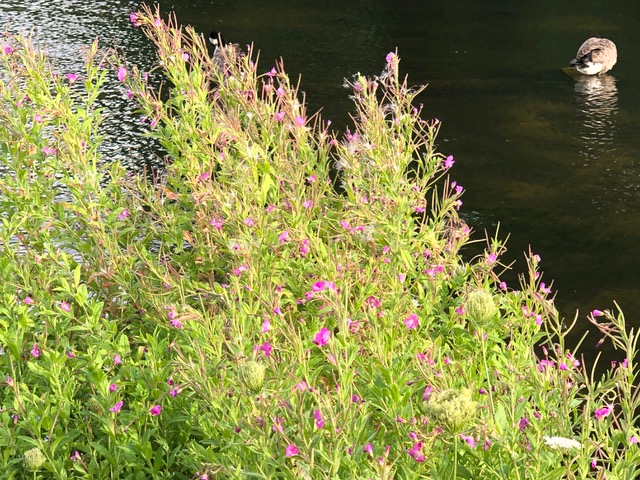Prostate remedies no:1 by Wimbledon Acupuncture and Herbs

Prostate remedies no:1
Willow herbs (Epilobium species)
The famous Austrian herbalist Maria Treben popularised the use of Small-Flowered Willow herb (Epilobium parviflorum) for successfully treating thousands of patients over her lifetime for prostate problems such as prostatitis, benign hypertrophic prostatopathy and even prostate cancer using this herb.
Small-Flowered Willowherb is predominantly found in the mountains of Central Europe, but two other common and more widely distributed species Hairy Willowherb (E.hirsutum) & Rosebay Willowherb (E.angustifolium) have a similar profile of active constituents and pharmacological activity as E.parviflorum, but are more common and more widely available.
Rosebay Willowherb (aka Fireweed in North America) is the commonest variety in the UK and is actually classed as an invasive weed in North America. It can be found alongside rivers and wet open areas on the edge of or in clearings within forests.

Anti-inflammatory and antioxidant properties
All three species of Willowherb demonstrate antioxidant and anti inflammatory properties. Willowherb extracts show significant inhibitory activity against the inflammatory enzymes hyaluronidase, lipoperoxidase and myeloperoxidase. *(3) and all Epilobium species showed potent antioxidant properties compared to other well known antioxidants such as ascorbic acid (Vitamin C) with E.parviflorum exhibiting the strongest antioxidant properties.*(4)
Anti-cancer properties
 Recent scientific research and clinical trials have confirmed that not only does Small-Flowered Willowherb show potent pharmacological activity against benign prostatic hypertrophy (BPH) and even prostate cancer cells, but that other Epilobium species, such as Hairy Willowherb (Epilobium hirsutum) and Rosebay Willowherb (Epilobium angustifolium) also share these properties and are equally as active pharmacologically.
Recent scientific research and clinical trials have confirmed that not only does Small-Flowered Willowherb show potent pharmacological activity against benign prostatic hypertrophy (BPH) and even prostate cancer cells, but that other Epilobium species, such as Hairy Willowherb (Epilobium hirsutum) and Rosebay Willowherb (Epilobium angustifolium) also share these properties and are equally as active pharmacologically.
A study published in 2013 *(1) demonstrated that extracts of all the above mentioned species were potent proliferation inhibitors of prostate cancer cells (LNCaP) and reduced prostate specific antigen (PSA) secretion.
The active constituents of the extracts identified as; oenothein B, quercetin-3-O-glucuronide, myricetin-3-O-rhamnoside, were proven to be active against LNCaP cells with oenothein B shown to be the strongest inhibitor of cell proliferation. Oenothein B is a macrocyclic tannin found abundantly in all 3 species making up 20-35% of the extracts and seems to be the primary active constituent. *(3)
Another constituent, ellagitannins found in E. hirustum extract, were shown to be metabolised by human gut microbiota into urolithins and urolithin-C was shown to have the most potent inhibitory effect against cell proliferation, PSA secretion and arginase activity.
Willowherbs can be taken as a tea or an alcoholic tincture.
References;
*(1) Extracts from Epilobium sp. herbs, their components and gut microbiota metabolites of Epilobium ellagitannins, urolithins, inhibit hormone-dependent prostate cancer cells-(LNCaP) proliferation and PSA secretion
Magdalena Stolarczyk et al. Phytother Res. 2013 Dec.
*(2) Evaluation of the Effect of Epilobium angustifolium Aqueous Extract on LNCaP Cell Proliferation in In Vitro and In Vivo Models
Jakub P Piwowarski et al. Planta Med. 2017
*(3) Oenothein B’s contribution to the anti-inflammatory and antioxidant activity of Epilobium sp
Anna K Kiss et al. Phytomedicine. 2011.
*(4) Polyphenol composition and antioxidant capacity of Epilobium species
Barbara Hevesi Tóth et al. J Pharm Biomed Anal. 2009.
